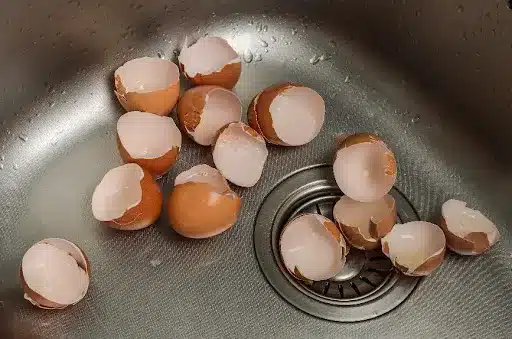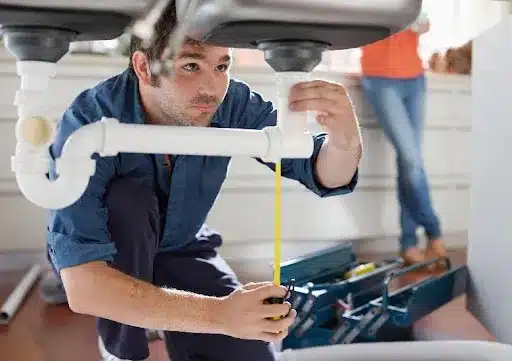The kitchen sink is an essential part of every home, but it’s important to remember that not everything can go down the drain. Improper disposal of certain items can lead to clogged pipes, damage to the plumbing system, and costly repairs. In this blog post, KB Complete, a trusted plumbing service provider in Mission, KS, will provide you with a comprehensive guide on what you can and can’t put down your kitchen drains. By understanding which items are safe to dispose of and which should be avoided, you can maintain a properly functioning and clog-free plumbing system.
Items You Can Safely Put Down the Kitchen Sink or Garbage Disposal
- Cold Water: Flushing cold water down the drain is not only safe but also beneficial. Cold water helps to solidify oils and fats and guides them through the pipes, preventing them from causing clogs. It also helps move food particles and other debris through the pipes, reducing the risk of blockages.
- Liquid Dish Soap: Liquid dish soap is designed to be water-soluble and breaks down easily, making it safe to go down the drain. It’s important to note that excessive use of dish soap can create foaming and clogs, so use it in moderation.
- Small Food Particles: Small food particles, such as those left on plates after a meal, can be safely rinsed down the drain. However, it’s important to avoid large quantities of food, as they can accumulate and cause clogs. Using a sink strainer can help catch larger food debris, preventing them from entering the drain.
- Coffee Grounds: Contrary to popular belief, coffee grounds can be safely disposed of down the drain or in the garbage disposal. However, it’s essential to use them in moderation and flush them with plenty of water. Large quantities of coffee grounds can clump together and cause blockages, so it’s best to avoid dumping them all at once.
- Citrus Peels: Citrus peels, such as those from oranges, lemons, and limes, are safe to put down the garbage disposal. They can help freshen the drain and eliminate unpleasant odors. The natural oils in citrus peels can also help break down grease and prevent buildup.

Items You Should Avoid Putting Down the Drain or Disposal
- Grease, Oil, and Fat: Grease, oil, and fat are some of the most common culprits for clogged drains. These substances solidify and cling to the inner walls of pipes, causing blockages over time. Instead of pouring them down the drain, collect them in a heat-resistant container and dispose of them in the trash.
- Pasta and Rice: Pasta and rice continue to expand when exposed to water, making them prone to swelling and causing blockages. Avoid disposing of large quantities of pasta and rice down the drain, as they can absorb water and create a sticky mess in the pipes.
- Eggshells: While eggshells themselves won’t necessarily cause immediate clogs, they can create problems over time. The thin membrane inside the shells can wrap around the blades of the garbage disposal, causing them to jam. It’s best to dispose of eggshells in the trash or use them for composting.
- Fibrous Foods: Fibrous foods, such as celery, onion skins, corn husks, and potato peels, should be avoided in the kitchen drain. These items can tangle around the blades of the garbage disposal, leading to jams and potential damage. Dispose of them in the trash or consider composting.
- Chemicals and Non-Biodegradable Items: Avoid putting chemicals and non-biodegradable items down the kitchen sink or disposal because these substances can have detrimental effects on both the plumbing system and the environment. Chemicals can corrode pipes, leading to leaks and potential water damage. Plastics and metals do not break down naturally and can cause severe blockages.

Why It’s Important to Take Proper Care of Your Plumbing
Taking care of your kitchen sink and disposal by avoiding harmful items, substances, or cleaners down the drain is crucial for the longevity and optimal functioning of your pipes. By following these guidelines, you can experience several advantages. You will prevent clogs, which can lead to plumbing repairs. Harmful substances and items can cause buildup, restrict water flow, and create obstructions in the pipes, resulting in slow drainage or complete blockages. You can also help protect the integrity of your pipes. Chemicals, corrosive substances, and abrasive cleaners can erode the pipes over time, weakening them and increasing the risk of leaks. By avoiding these harmful materials, you can maintain the structural integrity of your pipes, ensuring they last longer and perform efficiently. Lastly, by being mindful of what goes down your drain, you contribute to environmental sustainability. Avoiding the disposal of chemicals and non-biodegradable items helps protect water sources, reduce pollution, and support a healthier ecosystem. By adopting these practices, you promote the longevity of your plumbing system, save money on repairs, and contribute to a cleaner environment. Contact KB Complete to learn more!
Contact our Professional Plumbers Today!
When it comes to caring for your kitchen sink, it is crucial to listen to professional plumbers and adhere to their advice. Avoiding the disposal of harmful substances down the kitchen sink or disposal is of utmost importance. It not only prevents clogs, damage to pipes, and costly repairs, but also safeguards the environment. If you’re experiencing problems with the plumbing in your kitchen or require guidance on proper maintenance, don’t hesitate to contact the expert plumbers at KB Complete in Mission, KS. Their skilled team will promptly inspect your plumbing system, identify any issues, and provide excellent solutions to keep the plumbing in your kitchen running smoothly. Call KB Complete at (816) 207-3550 today for reliable plumbing services and enjoy peace of mind in your home.

